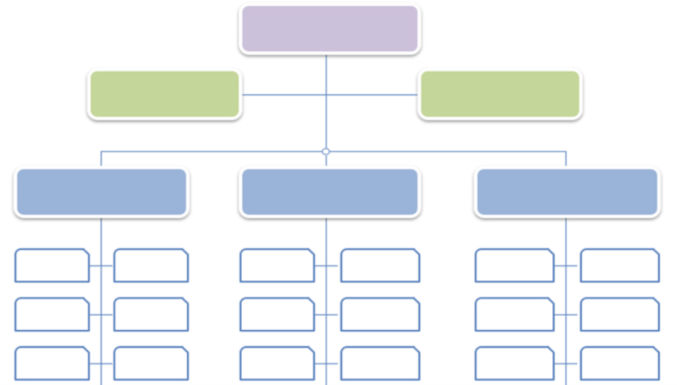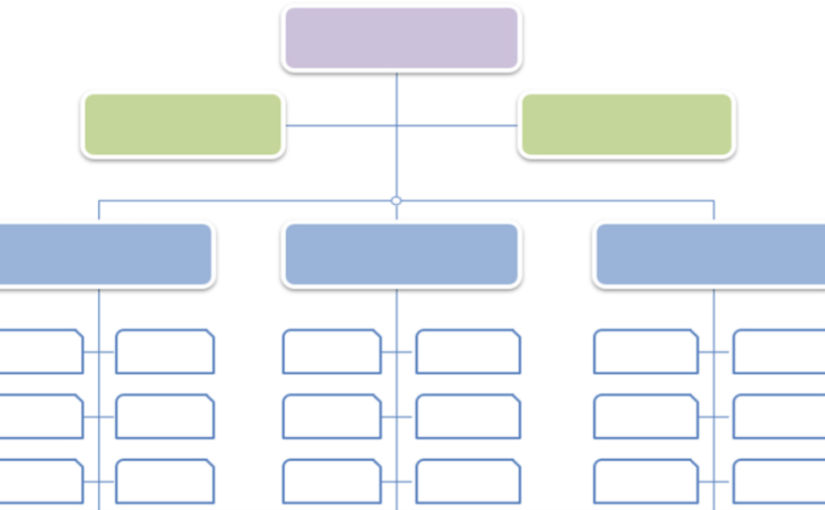
In my 12 years working in Marketing, I’ve see a few different organizational structures at both low and high levels. And in my particular role, I’ve had to work with pretty much everyone, which has given me exposure to many issues that often go unnoticed. While there are many ways you can structure an organization, whatever way you come up should always make sense based on your particular organization’s needs. Following is a structure that I think makes sense based on my experience. The specific job titles (chief, VP, director, manager, senior vs junior, etc) are just an example. The important thing is that the structure and hierarchy groups people by function, commonality and importance. The structure below is for a 2000+ employee organization. Obviously, if your organization is much smaller or larger and has more or less dependencies on particular functions, some positions and groups can be removed or consolidated or even divided and expanded.
Level 1:
- CMO (Chief Marketing Officer) or CPO (Chief Product Officer)
Level 2:
- VP of Marketing
- VP of Product
Level 3 and 4
Director of Content (or similar name)
This functional group primarily deals with marketing activities that involve text content. Since a big part of SEO involves text content, I put SEO Expert in this group.
- Public Relations Expert(s)
- Copyediting Expert(s)
- Proofreading Expert(s)
- SEO Expert(s)
- Social Media Expert(s)
- etc
Director of Design (or similar name, e.g. creative, etc)
This functional group primarily deals with marketing activities that involve visual design. Brand has to do with a company’s external public image, which relates to both public relations and design. Depending on your preference, this role could be under this “design” group or the “content” group above.
- Graphic Designer Expert(s)
- Web Designer Expert(s)
- Brand Expert(s)
- Video Expert(s)
- UI / UX Expert(s)
- etc
Director of Web (or similar name)
This functional group primarily deals with marketing activities that involve websites. Due to the criticality and complexity of today’s websites, significant dependencies that all functional groups often have on a company’s website, and unique technical skills that members of this group have, I made this group a standalone group rather than a subset of another group. Also, since email marketing is very effective, and because HTML emails contain code like that used on a website, I put HTML Email Expert(s) in this group. Though many marketing automation tools like Marketo include an email builder tool, I’ve found that they are limited in features and produce emails that don’t look professional unless the user has web development skills.
- HTML, CSS Expert(s)
- JavaScript Expert(s)
- WordPress Expert(s)
- HTML Email Expert(s)
- etc
Director of Marketing Operations (or similar name)
This functional group primarily deals with marketing activities that involve marketing automation tools like Marketo, revenue attribution tools like Bizible, data analysis and reporting tools like Tableau and Google Analytics, customer relationship management tools like Salesforce, lead processing and routing, etc.
- Marketing Automation, e.g. Marketo Expert(s)
- Customer Relationship Management (CRM), e.g. Salesforce, Experts
- Reporting and Data Analysis Expert(s)
- etc
Director of Channel Marketing (or similar name, e.g. demand generation)
This functional group primarily deals with marketing activities that fall under certain channels like events, e g. virtual or in-person conferences, partner marketing, etc, and demand generation activities like advertising campaigns such as Google Pay Per Click (PPC), email marketing, digital media marketing, print advertising, etc.
- Event & Event Marketing Expert(s)
- Partner Marketing Experts(s)
- Google PPC Expert(s)
- Campaigns Expert(s)
- etc
Director of Product (or similar name)
This functional group primarily deals with product management and product-specific marketing. For example, many tech companies have multiple products. Each product requires a specific subject matter expert, as it may be uncommon to find someone who is an expert in multiple products. Each product expert (commonly called “product manager”) basically is responsible for their own product, from understanding their product’s customers’ needs, making product feature decisions, helping market a product, e.g. by writing product page content, product-related blog posts, giving product-related webinars, etc.
- Product Expert for Product A
- Product Marketing Expert for Product A
- Product Expert for Product B
- Product Marketing Expert for Product B
- etc
Project Manager
There is one role that doesn’t quite fit in any of the categories above. Needless to say, many marketing activities require the collaboration of multiple functional groups, but each of these groups specialize in their own areas. There’s no such thing as a person or group who specializes (or is even interested) in everything. One big issue I often see is how certain marketing activities with a specific hard deadline, e.g. due to an earnings release or predetermined and pre-marketed event taking place, results in chaos, with many people working nights and weekends due to lack of planning, ownership and project management. That’s why there’s a particular title called Project Manager (PM) or Project Management Professional (PMP) and a certification where people can get a PMP certificate. These people don’t specialize in the various components that go into a project, but rather they keep a project on track to avoid delays, mistakes, oversight, etc. Sometimes, they have the boring task of having to keep reminding people to do their part to avoid delays caused by blocking subsequent tasks. Assigning a random person to be a temporary project manager may work for small projects involving few people, but for large projects involving many people, a “real” project manager who actually specializes in project management is needed.
Title Hierarchy
Here’s a title hierarchy commonly used in many companies.
- CEO
- President / COO
- Executive / C-Level
- EVP
- SVP
- VP
- Senior Director
- Director
- Senior Manager
- Manager
- Individual Contributor
- Principal
- Lead
- Staff
- Entry



